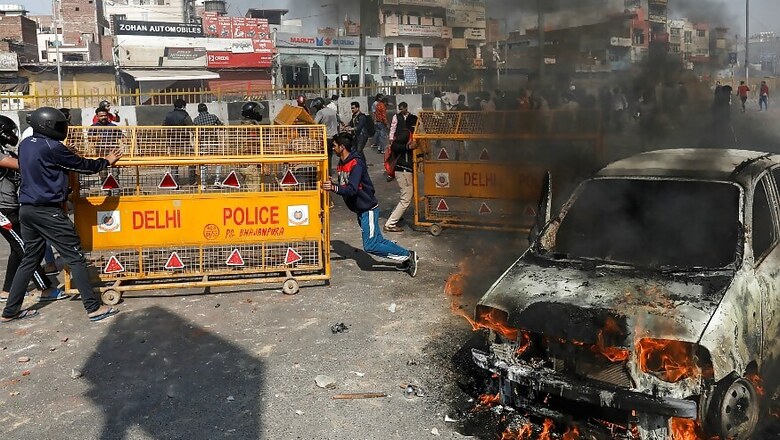
views
“The glory of justice and the majesty of law are created not just by the Constitution — nor by the courts — nor by the officers of the law — nor by the lawyers — but by the men and women who constitute our society — who are the protectors of the law as they are themselves protected by the law.” (Robert Kennedy)
Even as parts of Delhi burn and precious human lives are lost, politicians of all hue and shade have turned mute spectators. Millions of workers belonging to the Congress, the Aam Aadmi Party (AAP), the BJP and others are showing callous indifference in a year when the nation is celebrating 150 years of the apostle of peace, Mahatma Gandhi.
That moral courage and constructive dissent is in short supply in almost every political party has become most glaring and unfortunate now.
The unfortunate events in North-East Delhi offer a litmus test for Prime Minister Narendra Modi and Union Home Minister Amit Shah. It is their ‘raj dharma’ moment. Instead of condemning the orgy of violence, the National Democratic Alliance (NDA) government must establish supremacy of law. In this sense, a political rookie like cricketer Gautam Gambhir has stolen a march of sorts by instinctively demanding strict action against all those making provocative speeches, including his own party colleague Kapil Mishra.
“This is unfortunate. Whoever has done this, strict action must be taken - whether from BJP, Congress or AAP,” Gambhir said while visiting a hospital where injured policemen are being treated. “Kapil Mishra's speech is not acceptable. This is about Delhi, not about any political party.”
India’s contemporary history is littered with instances when the most powerful were told by friends and colleagues not to do wrong or take a path that was not conducive. There are many instances of how Sardar Vallabh Bhai Patel, Dr Rajendra Prasad, Rafi Ahmed Kidwai and Maulana Abul Kalam Azad could tell “Jawahar” not to take certain decisions. The prime minister often saw wisdom in the alternative opinion and went along with it.
At the time of our country’s independence, Mahatma Gandhi was walking barefoot village after village in Noakhali district of West Bengal, in a hostile atmosphere created by riots, making people pledge not to kill others. He carried holy books, appealing to Hindus as well as Muslims, to ensure peace.
There was a moving incident at one village where Gandhi reportedly asked the local Hindus and Muslims to come out of their hutments for a common prayer and a common pledge for peace. But nobody turned up. Gandhi waited for half an hour in vain. He then came up with an ingenious plan. He approached young boys with a ball and remarked, “Small kids from this village, your parents are frightened of each other but what fright you can have? Elderly Hindus and Muslims might be frightened of one another. But children are innocent. You are children of God. I am inviting you to play the game of ball.”
After playing with them for half an hour, Gandhi told villagers, “You have no courage but if you want that courage, induct it from your children.”
When Gandhi returned to Delhi, he learnt that his disciple Subhadra Joshi was hospitalised at Kingsway Hospital in Delhi. Gandhi came to visit her. He asked Joshi how many innocent lives had been lost in Delhi due to the communal violence. When Joshi speculated that the figure could be more than a thousand, Gandhi asked if it included some Congress peace-workers too.
Joshi recalled that Gandhi was dismayed to hear her reply “none” and he wondered how he could believe that she and the other Congress peace-workers had tried to save innocent lives.
“When I argued that we tried to stop the violence, but the police just did not listen, Gandhiji retorted, “What is this I am hearing! You faced the Britishers’ bullets and now you say you cannot manage your own police?”’
In the present context, the absence of Congress and AAP activists or peace volunteers is the most glaring. Few would be aware that the Congress supposedly has thousands of volunteers belonging to ‘Sadbhavna ke sipahi’ -- a pet project of Congress interim president Sonia Gandhi. Sonia had herself launched the forum in 2002 to promote social unity, and spread a message of peace, harmony and brotherhood. Actor Sunil Dutt (now dead) was made head of the corp. and its advisory panel comprised Manmohan Singh, Sharmila Tagore, Jairam Ramesh, Salman Khurshid and others. Surely, the ‘Sadbhavna ke sipahi’ charter was not to die with Dutt.
Rahul Gandhi, Sonia Gandhi, and perhaps Delhi Chief Minister Arvind Kejriwal should remember how, even as a prime minister, Nehru in early 1948 had rushed to quell a communal riot in New Delhi. Nehru, without any security cover, rushed into the thick of the fighting and shouted at a frenzied mob to stop. The startled crowd, recognising him, drew back. The riot stopped.
Nehru had articulated the bottom-line of the Congress secular creed at a meeting in the Ram Lila grounds on Gandhi Jayanti in 1951. “If any man raises his hand against another in the name of religion, I shall fight him till the last breath of my life, whether from within the government or outside,” Nehru had remarked.
(The author is a visiting Fellow with the Observer Research Foundation. Views are personal.)














Comments
0 comment